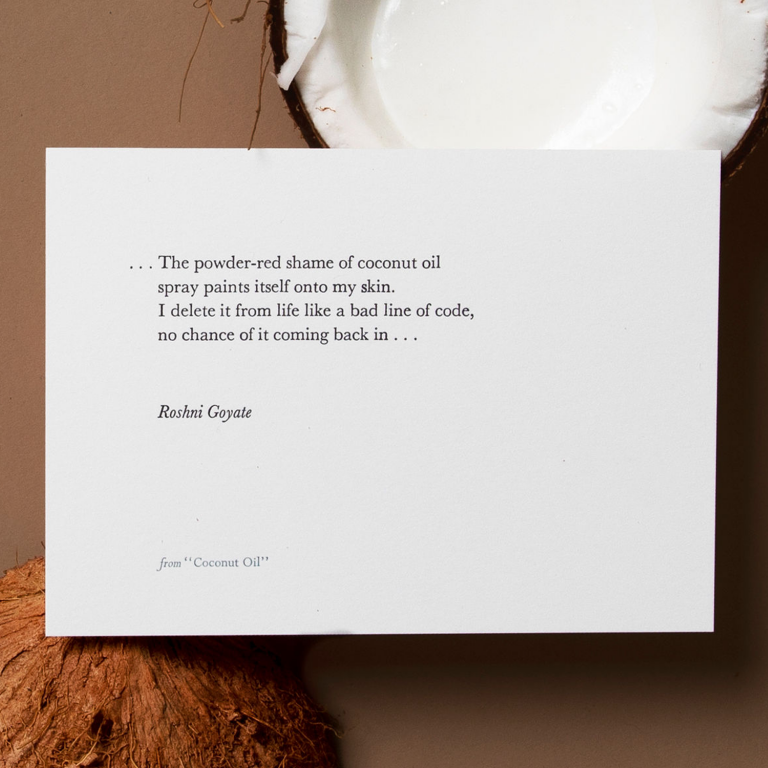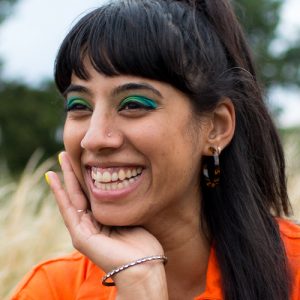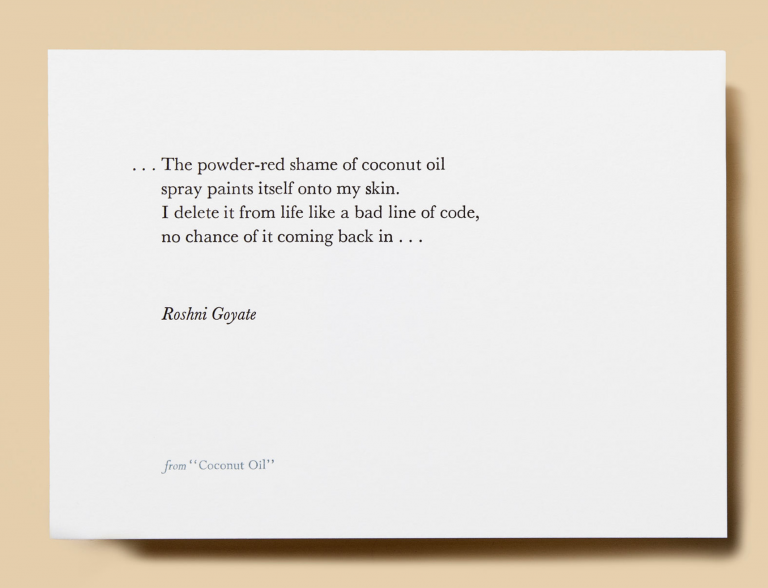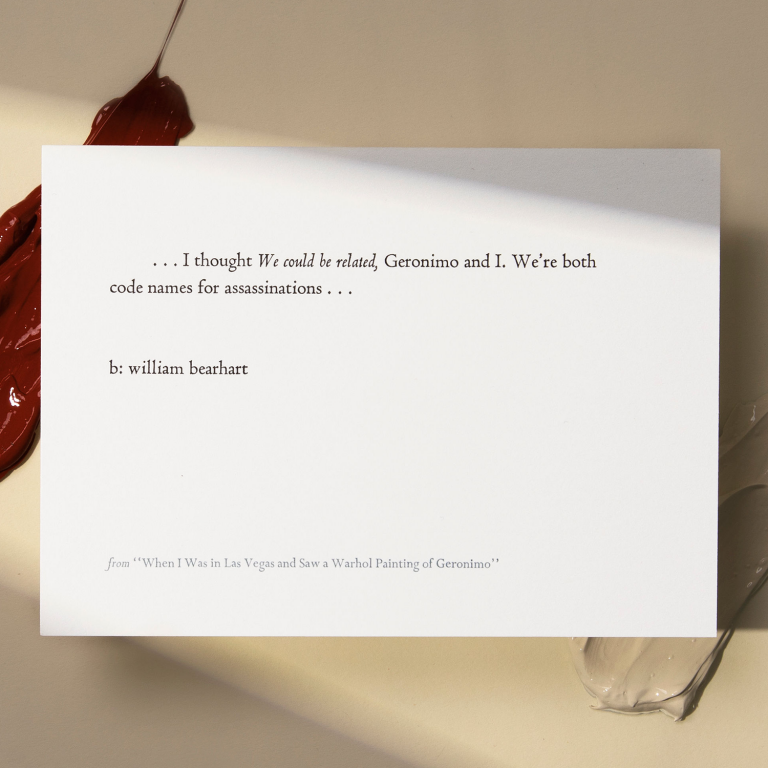Roshni Goyate
Coconut Oil
In many ways this poem can be analyzed by how it ends: by examining the contents of organic shops. Roshni Goyate looks at one such item — coconut oil for hair — and considers its long line of history in her British-Indian family. As a child, she was shamed by classmates for using coconut oil in her hair, but now it’s double the price in shops. In a cruel irony, her race and culture were both hypervisible to those who taunted her and rendered invisible by those same people who invalidated her presence and citizenship.

Letterpress prints by Myrna Keliher | Photography by Lucero Torres © All Rights Reserved.
Guest

Roshni Goyate is one quarter of the 4 BROWN GIRLS WHO WRITE poetry collective. Together they have published a book of poetry, a zine of essays, and most recently, a collection of solo works, published by Rough Trade Books, in which Roshni's pamphlet, Shadow Work, appears. Roshni is a Londoner, proud daughter of Indian immigrants and co-founder of The Other Box, an inclusion and equity company.
Transcript
Pádraig Ó Tuama: My name is Pádraig Ó Tuama, and when I read poetry, one of the questions that’s always in the mind is, who is the “I”? Who’s speaking here? And often, of course, when you’re reading a poem, you want to think, Oh, I’m being invited into the “I.” I’m being invited into the experience of the speaker and the outrage of the speaker. But often, these days, when I read poetry, I realize that I am not being invited into identifying with the “I,” the speaker of the poem; I’m being identified into being the “you,” the one who might be challenged, the one who’s being up for critique.
[music: “Praise the Rain” by Gautam Srikishan]
“Coconut Oil” by Roshni Goyate:
“Vatika bottle sits in the bathroom,
contents solidified by London’s night.
Mum microwaves it to a clear sap—
an ancestral ritual improvised.
She sits me down, braids unplaited,
drags plastic comb through my hair.
Ouch Mummy, Mummy not too hard!
Pretends my squeaks are not there.
Drip-drip onto my invisible scalp.
Grap-grip with the palms of her hand.
Rub-rub rub-rub taming flyaways.
Slap-slip onto the slick-dark of strands.
A soft scent, sweet and buttery, slippery
tinged with metallic sweat of my brow,
provokes questions in the playground,
Why do you smell so funny? How?
The powder-red shame of coconut oil
spray paints itself onto my skin.
I delete it from life like a bad line of code,
no chance of it coming back in.
When suddenly, this hair oil that gave me such grief
comes back for wellbeing’s bright new age.
No longer smelling funny, a great white commodity
marked up for organic food shops. All the rage.”
[music: “Zither Sprak” by Blue Dot Sessions]
I love this poem for a whole variety of reasons, possibly chief among which are the last three words: “All the rage.” There’s the upfront meaning — “all the rage,” meaning fashionable or “everybody’s getting it.” A new style of fashion, a tattoo, a style of jeans, whatever — “it’s all the rage.” But in Roshni Goyate’s poem, we can also think of rage, and all the rage. Who gets to decide what a person can do with their hair in public or with how they dress, or how they appear or who they are in public? Who gets to decide who will be ridiculed and who won’t be? And suddenly, because a product is available in a fancy shop that white people are going to go to, something’s OK now. But the people who’ve been using it all along, right back to their ancestors, suddenly they don’t have to face ridicule, because somebody else has decided it’s OK? That is worthy of rage.
And even deeper than the question as to who gets to decide it, who’s profiting from this? Presumably, the places where Indian families in Britain would’ve gone to have gotten coconut oil, it was still there, but now coconut oil for scalp is appearing in organic food shops. And I like organic food shops, but what this is doing is it’s turning the attention on a question of maybe people like me, who would think, God, aren’t we doing well because we’re shopping organically, and saying, “You’re being fooled, and while you’re being fooled, you’re also participating in something that’s deeply problematic and has racism at its heart, in terms of its imagination about what’s new.” All the rage. So I’m totally in love with the power of those last three words.
And I think, when you realize that the last word is “rage,” you can suddenly go back and look at all these other words of power throughout the poem and create almost like an erasure poem of these words of power and pain: “Ouch,” “pretends,” “invisible,” “taming,” “flyaways,” “metallic sweat of my brow,” “provoke,” “shame,” “skin,” “delete,” “bad line,” “grief,” “white,” “commodity.” And when you start to trace backwards through this poem, you find an enormous amount of power in those words.
[music: “What Did You Not Hear” by Gautam Srikishan]
So this poem sets itself up in a kind of a rhyming style, especially at the start, the kind that you might’ve learned in primary school or elementary school. You can perhaps even hear a class of children chiming off this stanza, “She sits me down, braids unplaited, / drags plastic comb through my hair. / Ouch Mummy, Mummy not too hard! / Pretends my squeaks are not there.” And the poem is written, at the start, with a really simple recital way. And then there’s the wordplay, as well — “drip-drip,” “Grap-grip,” “rub-rub,” “Slap-slip,” “slick-dark.” And within the context of that, you can hear childhood being echoed, and various experiences of childhood: childhood at home, childhood being prepared to be sent out, and then childhood being sent out.
But then the poem changes, and the poem turns, and we hear that there is mocking happening: “Why do you smell so funny? How?” And that “how” is such a demand. It is a voice that’s saying, prove yourself. And it also asks the speaker of the poem to make a choice. And this might be a choice that lots of immigrants feel or lots of first generation children of immigrants or lots of people, for a whole variety of reason, feel like they have to make a choice between how they perform at home and how they perform with their friends at school, in order to fit into a certain established government that says, “This is what’s acceptable, and this isn’t.”
And this poem could be about that, but it’s not. It goes really deep into the question of economics and capitalism, I think, because it says, who are things suddenly made cool for? Who decides what goes on the shelf of an organic food shop? Who decides what suddenly becomes a “great white commodity?” And people might say, oh, we’re rediscovering coconut oil for your scalp, as if it had ever been forgotten, as if it needed to be rediscovered, as if somehow the fact that entire populations of people have been using it is invisible.
And that’s what it’s saying, that this rediscovery, so-called, is saying, “You’ve been invisible up to now. Suddenly, what’s important to you seems important to us. So, therefore, it’s important.” And this is the voice that matures through the poem. I think it’s such a clever way to write — to write almost in the voice of a child, at the start, and by the end, there’s the voice of the analyst and the voice that has turned the attention back, not on the privacies of a family ritual, but on the commodification that can happen through a society and through a particular product like scalp oil, coconut oil.
[music: “Toothless Slope” by Blue Dot Sessions]
Roshni Goyate is one part of a four-poet writing collective named 4 BROWN GIRLS WHO WRITE. And they met as part of a WhatsApp writing group, an instant message service. And what I love is that the story of their publishing is that they recite together, and they’ve published together, as well. This collection of four pamphlets of poetry, published by Rough Trade Books, this brings together four pamphlets from four voices: Sharan Hunjan, Sheena Patel, Sunnah Khan, and Roshni Goyate. And, inasmuch as this is a poem that critiques capitalism, the writing collective of the four of them also is a critique into a publishing world, where there might have been an idea to say, “Well, let’s see which one of the four of this group are the most publishable or the most likely to get published here or published there.” And in their artistic lives, in their performance lives, and in their publishing lives, 4 BROWN GIRLS WHO WRITE are offering a critique and demonstrating the creativity and productivity of an entirely different way of imagining what being a poet in public looks like.
[music: “Waterbourne” by Blue Dot Sessions]
This poem, like lots of poems, really knows about time and that in the experience of a person is their immediate experience of their now. It contains, also, their immediate experience of their memory of their childhood and their memory of whoever was at home during their childhood, and then whatever ancestral lines have been influencing that experience. And then this poem jumps ahead in time and offers a critique back. And the poem is turning around and around with time and bringing time and the question as to who is privileged enough to have an easy time, during a particular time, into the spotlight. And it turns its gaze, this poem does, onto that kind of power — who profits from that, who decides that, and who makes their mind up that this is going to be cool now, when before, it wasn’t.
There’s a particular line that I think is a really powerful line, in the second last stanza: “I delete it from life like a bad line of code.” This is a very different voice than is saying, “Ouch Mummy, Mummy not so hard!” or even, “Rub-rub, rub-rub taming flyaways.” “I delete it from life like a bad line of code” — the “I” here, the speaking voice, Roshni Goyate’s voice, suddenly codes computers and is coding a life, and has made a really stark choice not to hide something, but to delete it. And what’s deleted? A connection with parents, a connection with family tradition, as well as a sense of confidence, a sense of pride; tending to your body in a way that’ll get racist abuse from classmates or colleagues — that’s what’s being deleted.
And this isn’t a story just of what happens in the playground anymore. This is a voice that can code and un-code. And that voice is speaking to today. And this is a way where we are being brought, not to think, oh, isn’t it cool that the old ways are coming back again, because it’s saying, the old ways never left. People were forced into stark choices about their own safety, about their own fitting in, and told you have to leave that deliberately behind. And so it isn’t that cultures have forgotten their ways and are reclaiming them, it’s that somebody else was exerting dominance. And this is all held together so powerfully in that line, “I delete it from life like a bad line of code.” And I can almost hear the anger of Roshni Goyate thinking, “That’s what I did, and that’s what I was forced to do, in order to survive in that situation.”
[music: “What Did You Not Hear” by Gautam Srikishan]
“Coconut Oil” by Roshni Goyate:
“Vatika bottle sits in the bathroom,
contents solidified by London’s night.
Mum microwaves it to a clear sap—
an ancestral ritual improvised.
She sits me down, braids unplaited,
drags plastic comb through my hair.
Ouch Mummy, Mummy not too hard!
Pretends my squeaks are not there.
Drip-drip onto my invisible scalp.
Grap-grip with the palms of her hand.
Rub-rub rub-rub taming flyaways.
Slap-slip onto the slick-dark of strands.
A soft scent, sweet and buttery, slippery
tinged with metallic sweat of my brow,
provokes questions in the playground,
Why do you smell so funny? How?
The powder-red shame of coconut oil
spray paints itself onto my skin.
I delete it from life like a bad line of code,
no chance of it coming back in.
When suddenly, this hair oil that gave me such grief
comes back for wellbeing’s bright new age.
No longer smelling funny, a great white commodity
marked up for organic food shops. All the rage.”
[music: “Praise the Rain” by Gautam Srikishan]
Lily Percy: “Coconut Oil” comes from Roshni Goyate’s pamphlet “Shadow Work,” as part of the collected work of 4 BROWN GIRLS WHO WRITE. Thank you to Rough Trade Books, who gave us permission to use Roshni’s poem. Read it on our website, at onbeing.org.
[music: “Praise the Rain” by Gautam Srikishan]
Poetry Unbound is: Gautam Srikishan, Chris Heagle, Erin Colasacco, Eddie Gonzalez, Lilian Vo, and me, Lily Percy.
Our music is composed and provided by Gautam Srikishan and Blue Dot Sessions. This podcast is produced by On Being Studios, which is located on Dakota land.
We also produce other podcasts you might enjoy, like On Being with Krista Tippett, Becoming Wise, and This Movie Changed Me. Find those wherever you like to listen, or visit us at onbeing.org to find out more.
Books & Music
Recommended Reading
The On Being Project is an affiliate partner of Bookshop.org and Amazon.com. Any earnings we receive through these affiliate partnerships go into directly supporting The On Being Project.










Reflections